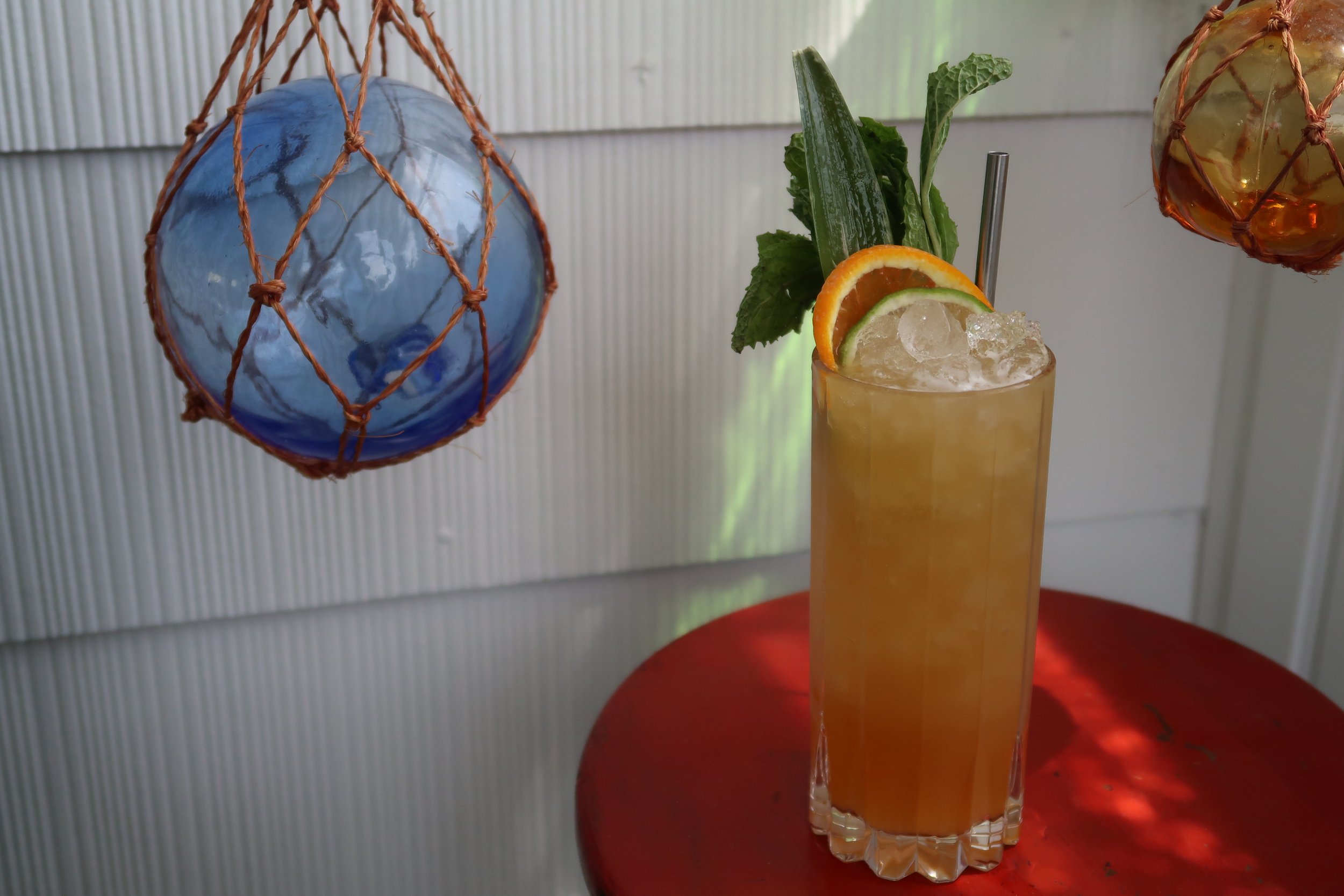Pineau des Charentes & Pommeau de Normandie
Both of these beautiful products are mistelles, which are produced by adding unfermented or partially fermented juice to full-proof spirit (typically in a ratio of 3:1 juice to spirit) and barrel aging it. Pineau des Charentes is produced in the same region as Cognac and combines unfermented grape juice with 1-year-old Cognac. Some are bright and lively while others have earthier, dried-fruit notes. The Pommeau is produced similarly, but in Normandy, an apple-rich coastal region in the northwest. It’s typically 75% unfermented apple juice and 25% Calvados and delivers not only big apple flavor but a wonderful texture as well.
Pastis
Gaëtan Lassale is one of my oldest friends. We studied in Canterbury, England, together back in the early aughts. Gaëtan grew up in a village in the south of France, eating dinner with his family on the terrace every night in the summer. They ate lots of grilled meat and vegetables, along with ratatouille and aubergines in tomato sauce, which were prepared in the cooler morning hours and served cold in the evening. His grandmother liked to beat the heat by drinking the anise-flavored spirit pastis with chilled water ─ a popular drink in Marseille.
Olivier
Last year I had the good fortune of connecting with Zac Overman, who sent me a copy of Cocktails a L’Américaine, a compilation of L’Oursin’s house cocktails. The book is full of complex drinks rooted in American mixology that utilize the best of French and alpine spirits, wines, and liqueurs. But because of our August theme, I chose to feature this elegant bitter highball, which showcases the style of French drinking we’re celebrating this month. It’s named after the Corsican cheesemonger who supplies L’Oursin.
Kir-Any-Way
My friend Rebekah Peppler has a talent for transporting her readers to France. Her books, Apéritif and À Table give us a window into her life in Paris and highlight traditional French food and beverage. When I was perusing her books for this month’s programming, I noticed that her collection of Kir variations is like a mini road trip through France, from Normandy and Brittany to Burgundy, Paris, Champagne, and beyond. So, grab a bottle of crème de cassis, choose your variation(s), and be transported!
Lockport Sling
This one’s basically a sparkling sling with a little pop of acidity from the cordial. The combination of cherries and baking spices reminds me of eating cherry cobbler (or pie!) outside toward the end of a long summer’s evening.
Summer Sangaree
The Sangaree is one of the oldest in the tavern drinks canon and its existence long predates the foundation of the United States. Ours makes the most of summer’s bounty and mimics the presentation of the Sangaree’s more famous offspring — the Spanish punch Sangria.
Erie Canal Fix
The fix is one of the great pre-Civil-War templates but, for such a great drink, it doesn’t get nearly enough attention. Our version features a split base of genever and rye, both grain-based spirits and two of the megastars of early cocktail culture. Be sure to garnish with abandon.
Holland Gin Smash
The smash has evolved over its more than 150-year history. Our version splits the difference between its past as a small, shaken julep and its modern-day life as a muddled affair. I really love this presentation.
Mai Tai
The Mai Tai is Victor “Trader Vic” Bergeron’s most famous creation and one of the great drinks of the tiki canon. Rum expert Shannon Mustipher’s version offers the ingenious introduction of a small measure of unaged rhum agricole. I’ve made just a couple of slight alterations based on our supply list.
Planter’s Punch
Planter’s Punch is a centuries-old Caribbean recipe and was the basis for Donn Beach’s earliest “Rum Rhapsodies.” St. John Frizell and his bar staff at Gage & Tollner serve this excellent rendition of the classic, which appeared on the G&T cocktail list in the 1940s, and likely before.
1950 Zombie
Ned King helped me immensely in planning this month, including bringing this post-WWII Zombie to my attention. Though different from the 1930s Zombie, this version reads as a direct descendent of Planter’s Punch. I’ve made a couple of changes to Ned’s spec based on what we have on hand this month.
Missionary’s Downfall
This is a Don the Beachcomber original from 1937. Ned King has spent a lot of time perfecting this recipe, which is fresh and bright. We’ve taken a couple of small liberties to minimize our supply list, but the spirit of Ned’s spec for this early tiki classic shines through.
Improved Brandy Cocktail — Iberian Edition
This is the second in my Improved Cocktail series in the spring of 2021. With deep, dark flavors, this Improved Brandy Cocktail - Iberian edition - emphasizes the importance of products from Portugal and Spain in the history of the American Cocktail and, before that, in Punch and early modern drinking history, generally.
Improved Whiskey Cocktail — Pennsylvania Edition
I’ve centered this Improved Whiskey Cocktail, the third in my Improved Cocktail series from spring 2021, on rye. Rye was the mixing (American) whiskey of choice through the nineteenth century, with only some exceptions that call for Bourbon, which was still a very regional product. Unaged apple brandy brightens things up, while Madeira and apricot liqueur team up to lend a buttery stone fruit profile. An uncommon sweetener in the form of brown sugar syrup grounds the whole thing and points to the colonial-era inspiration behind the drink, bolstered by walnut bitters and nutmeg.
Improved Holland Gin Cocktail — Java Edition
This cocktail was part of my Improved Cocktails series in the spring of 2021. I’d tackled the Holland gin version before, but this version employed my use of two spirits as the base (genever and arrack), along with fortified wine (oloroso sherry), liqueur (crème de banane, sweetener (zesty lime-ginger syrup), and chocolate bitters.
Brooklyn 2008
The original Brooklyn Cocktail first appeared in print in 1908 as a mixture of rye, dry vermouth, Maraschino and French bitter liqueur Amer Picon. Fast forward 100 years to the heyday of the Cocktail Renaissance, where forgotten classics, European bitters, and añejo tequila all landed on the scene with a splash.
Philadelphia, Mexico
I have been playing around with a tequila-based version of Philadelphia’s own Clover Club for over a year now and finally landed on this beauty. An unusual sort-of reverse dry shake technique makes the use of jam and desire for perfect egg white texture achievable.
Hugo’s Bitter Bracer
While looking for a way to use this month’s amaro in a shaken drink with roots in the early 20th century, I happened upon Hugo Ensslin’s “Hugo Bracer” from 1917. Originally a mix of apple brandy, lime, Amer Picon and grenadine served in a goblet, ours goes in a yet-more-tropical direction, expressing what I’d call a proto-“tiki” aesthetic.
Tequila Martini
This is an ode to the imaginary point in time, in this month’s period of interest (1900- 1919) when the prevailing Martini ratio was 2:1. Bright, briny fino or Manzanilla sherry works in perfect harmony with the blanco tequila, all of which is enhanced by a little salinity and citrus.
An April’s Eve
Tom Bullock features quite a few fizzy cocktails in his book, but I particularly love the Twilight Cocktail, which is an unsweetened mixture of Bourbon, Italian vermouth, lime and seltzer. I take the edge off the sour notes with our cordial, sink the vermouth to the bottom, and insist on Club soda over seltzer here—the hint of salt is just what this drink needs.




















